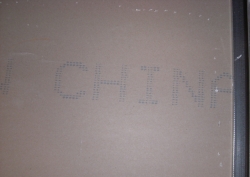The Defective Drywall Protocol Offered by BESI Exceeds the Interim Remediation Guidance by CPSC and HUD - No Rework Necessary
The Consumer Safety Product Commission and HUD published an interim remediation guidance dated April 2, 2010 since many owners are desiring to start repairing their homes or commercial buildings. BESI has been endorsing and providing certification for a remediation protocol since October of 2009 which exceeds the published interim remediation guidance.

Gainesville, FL, April 07, 2010 --(PR.com)-- The Building Envelope Science Institute (BESI) has been offering certifications for inspection and remediation of defective drywall since October 2009 and is hosting its next seminar on May 3-4, 2010 at the Courtyard Fort Lauderdale Coral Springs located at 620 N. University Drive, Coral Springs, Florida. For conference details visit www.BESInstitute.org.
The Consumer Product Safety Commission (CPSC) and the Department of Housing and Urban Development (HUD) released their “Interim Remediation Guidance for Homes with Corrosion from Problem Drywall” dated April 2, 2010 and it was no surprise that the protocol being presented by BESI since October 2009 exceeds this guidance. It’s good to know that if your home was remediated under this protocol that it would not require more work in order to meet the CPSC & HUD interim guidance. The Institute has a document that helps explain the protocol called, “The BESI System: Understanding the Protocols for Defective Drywall” which is posted on the website.
The protocol offered through BESI provides (to-date) the most comprehensive remediation process and was developed based on proven science; nicknamed the “BESI System” because of the institute’s endorsement. The protocol for remediation of defective drywall being offered by BESI considers the following major factors: corrosion, cross-contamination of other building materials, personal belongings, IAQ monitoring program, a proposed national warranty (not an insurance policy), and removal of the stigma from having defective “corrosive” drywall.
The institute has looked into the various protocols that have become public over the last several months; however, the institute continues to endorse the protocol developed by the Defective Drywall in America (DDIA) workgroup which was designed to help owners, insurance companies, investors, financial institutes, and builders recover from the stigma of having defective “corrosive” drywall.
The certification program offered through the Institute (BESI) instructs and trains licensed and approved state contractors in the remediation of defective or corrosive drywall. The institute will provide information on other available remediation methods during its training seminar; however, BESI certification is only being offered on the DDIA developed protocol since the other remediation methods do not require a high standard of training nor do they offer third-party quality control.
The Building Envelope Science Institute has a “Nationwide Directory of Members” that currently allows individuals to locate BESI certified inspectors and remediators for defective “corrosive” drywall in their area and compare the services offered by these companies.
To learn more about the Institute, go online to www.BESInstitute.org, or contact info@BESInstitute.org.
###
The Consumer Product Safety Commission (CPSC) and the Department of Housing and Urban Development (HUD) released their “Interim Remediation Guidance for Homes with Corrosion from Problem Drywall” dated April 2, 2010 and it was no surprise that the protocol being presented by BESI since October 2009 exceeds this guidance. It’s good to know that if your home was remediated under this protocol that it would not require more work in order to meet the CPSC & HUD interim guidance. The Institute has a document that helps explain the protocol called, “The BESI System: Understanding the Protocols for Defective Drywall” which is posted on the website.
The protocol offered through BESI provides (to-date) the most comprehensive remediation process and was developed based on proven science; nicknamed the “BESI System” because of the institute’s endorsement. The protocol for remediation of defective drywall being offered by BESI considers the following major factors: corrosion, cross-contamination of other building materials, personal belongings, IAQ monitoring program, a proposed national warranty (not an insurance policy), and removal of the stigma from having defective “corrosive” drywall.
The institute has looked into the various protocols that have become public over the last several months; however, the institute continues to endorse the protocol developed by the Defective Drywall in America (DDIA) workgroup which was designed to help owners, insurance companies, investors, financial institutes, and builders recover from the stigma of having defective “corrosive” drywall.
The certification program offered through the Institute (BESI) instructs and trains licensed and approved state contractors in the remediation of defective or corrosive drywall. The institute will provide information on other available remediation methods during its training seminar; however, BESI certification is only being offered on the DDIA developed protocol since the other remediation methods do not require a high standard of training nor do they offer third-party quality control.
The Building Envelope Science Institute has a “Nationwide Directory of Members” that currently allows individuals to locate BESI certified inspectors and remediators for defective “corrosive” drywall in their area and compare the services offered by these companies.
To learn more about the Institute, go online to www.BESInstitute.org, or contact info@BESInstitute.org.
###
Contact
Building Envelope Science Institute
Richard Shaffer
877-688-BESI
www.BESInstitute.org
Richard Shaffer
877-688-BESI
www.BESInstitute.org
Multimedia

Understanding the Remediation Protocols for Defective Drywall (BESI)
This twelve page document is designed to help you understand the remediation protocol that BESI is endorsing. It discusses the protocol development, corrosion, cross-contamination, personal belongings, BETA home program with IAQ monitoring and a proposed warranty.
Categories

